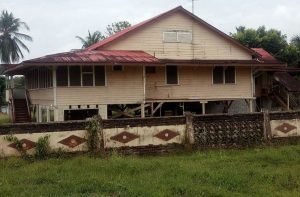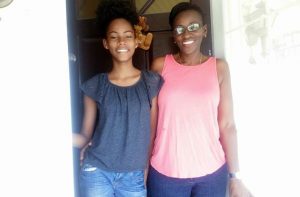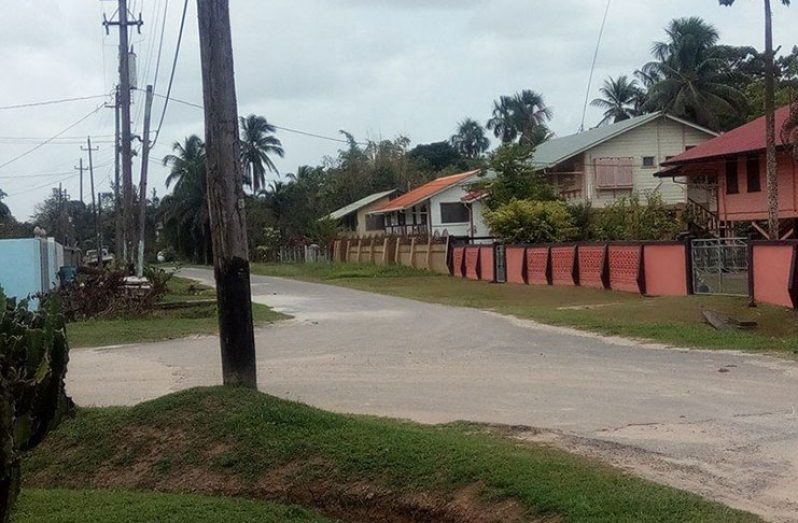THE little community of Watooka, located on the Mackenzie shore in the mining town of Linden, has its history enshrined in the commencement of bauxite mining.
With the establishment of the Canadian-run Demerara Bauxite Company (DEMBA), the first such company here, the community of Watooka was established expressly for the white expatriates and their families.
Wooden mansions were soon constructed for this elite little group, and an apartheid-like system was strictly enforced. The entrance to the community was secured with a barrier, and manned by a constable, whose responsibility it was to ensure that all local visitors — who most times were maids, gardeners or caretakers — were furnished with passes and gave a detailed explanation for their visit.

As bauxite production spiralled and the company grew, there was need for more expatriates, so similar apartheid-like communities were established in close proximity to Watooka. These communities were Fairs Rust, Noigtdacht, and Richmond Hill.
And as families grew, there was now need for a school and other social facilities which quickly erupted. Of course, only the children of expatriates were allowed to attend the Watooka Day School, as it is now called, and enjoy the other social facilities such as the Watooka Swimming Pool.
A historical feature of the community’s development was the construction of the Watooka Club, replete with a guest house to accommodate the ‘industrial customers’ and shareholders of the company who went there on business; business that greatly increased with the demand for aluminium at the onset of World War II.
Steve Connolly, who grew up there as a child and has since authored a book titled “Children of Watooka”, recalled during the launch of the bauxite mining centennial activities last year that even Dr Cheddi Jagan and his wife were once turned away from the guest house because he was not white.
In his memoir, Connolly, now in his 80s, drew heavily on his childhood days spent at Watooka, recalling fond memories of learning to swim in the pool there and attending the community’s school.
WATOOKA TODAY
When the whites left, however, taking with them their apartheid-like system, even though the community was still reserved for company managers and still exuded an air of exclusivity, it mattered not the race or nationality as time progressed.
Today, Watooka is a multi-ethnic, multi-cultural, multi-religious community of roughly 120 residents.
And while many of the old DEMBA houses are still standing, many residents have opted to renovate their property.

Despite this, the community still has this ancient historic residential feel to it. When walking through the interior streets, if a pin drops, one could hear it.
Things have changed drastically in the community, and while some changes are for the better, some brought on challenges. Ms Allison Luckhoo, an old-time resident of Watooka, told the Guyana Chronicle that her love for the community comes with its quietness and reserved atmosphere.
“It is more family-oriented; you could bring up your children in the way you want to. And the thing is, we live so far apart, there is not much mixing to influence your children in a negative way,” the mother of four said.
Added to this, she said, there are a lot of positive and influential figures in the community whom the children look up to as role models and emulate. “Some of them are doctors, some are lawyers, entrepreneurs, pastors,” she said, adding:
“So you look at them, and you want to emulate their examples and want to be that person.”
As a result of this, there are not many social ills plaguing the youths in the community such as teenage pregnancy and school dropouts.
“Most of the young people here are pursuing an education; they are at the University of Guyana or probably UWI or probably overseas studying,” Ms Luckhoo said.
LOVE AND UNITY
Another positive of the small community is the closeness among the residents, despite the houses are some distance apart from each other. Residents boasted to the Guyana Chronicle of the way they look out for each other and render assistance when necessary. “It’s like a family community; the neighbourhood is good. If you run short of anything, you can always ask your neighbour for help,” another resident, Ms Janice Lake said.
She shared similar sentiments as Ms Luckhoo. “I love the way we live in love. If you have a need, you can call and will get assistance; we look out for each other, so to speak.”
Everyone is their brother’s keeper, and since most of the residents attend the community’s church, the unity is strengthened. This is also reflected in the active Community Development Council and the members who reach regularly to address issues and to put forth solutions in an effort to alleviate challenges.
THE CHALLENGES
One of the challenges, due to the absence of company management, is the degradation of the community’s infrastructure. Residents pointed out that the roads are in a deplorable

state, and the dust from the roads when vehicles drive by is posing a serious health hazard.
“The dust affects us bad. We call; we made complaints, but nobody is doing anything,” Ms Luckhoo said. “We have the CDC group and we reported this, but they are saying that they themselves have no control over this, but nothing is being done…
“The roads need fixing. They did a few patches here and there, but there is still more to be done; lots more to be done,” she added.
Janice Lake is extremely affected by the dust, since she is allergic to it. “It is very, very dusty! The vehicles just fly past, so the dust affects me quite a lot. It also gives off an odour, and I am allergic to that too. So when I inhale that dust, I sneeze a lot,” she said.
Residents also talked about how the unavailability of public transportation affects them, particularly those who don’t have their own vehicle.
These residents are either forced to walk 20 minutes to the Linden Hospital to access a ‘short-drop car’ or face a hefty taxi fee. But according to Ms Luckoo, with life comes many challenges, so one might as well accept them, as the positives far outweigh them.




.jpg)










